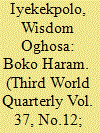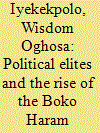| Srl | Item |
| 1 |
ID:
149440


|
|
|
|
|
| Summary/Abstract |
Boko Haram insurgency has caused the death and displacement of thousands of Nigerians. Its means of terror has evolved from the use of crude weapons to bombs, kidnappings and the use of children as suicide bombers. Its reach has expanded beyond Nigeria into neighbouring West African countries and it has pledged allegiance to Al-Qaida and Islamic State. To address this security concern, its cause should first be ascertained. This paper argues that to do this, Boko Haram should be located in northern Nigerian historical context/environment. This paper reviews economic greed and grievance, extreme religious ideology and political opportunity in historic insurgencies in northern Nigeria. It finds that while the interplay of different factors shaped these insurgencies; it was political opportunity that ignited their onsets. Finally, the article submits that as long as these factors remain the same, military quelling of Boko Haram will not prevent a re-emergence of its likes.
|
|
|
|
|
|
|
|
|
|
|
|
|
|
|
|
| 2 |
ID:
172198


|
|
|
|
|
| Summary/Abstract |
What is the cause of Boko Haram insurgency in Nigeria? Studies on Boko Haram insurgency onset has largely emphasized economic poverty, religious ideology, and the historical north-south identity fractionalization. Some others which focus on Nigerian politics as the cause of the insurgency have largely analyzed how corrupt politicians have caused economic poverty and inequality which have resulted in grievances in northern Nigeria. While these studies have made invaluable contributions to the literature, this study begs to deviate from their emphasis by showing how political elites have mobilized and given political relevance to the Boko Haram group. This study specifically investigates the cause of the insurgency by adopting the state-centered approach which argues that insurgencies are caused by structural vulnerabilities in certain kind of states. In doing this, this study advances the following four propositions. Firstly, when factions of political elites compete for political power at the national level on identity basis, identity groups emerge at the subnational level in defense of these identities. Secondly, identity groups gain political relevance when factions of the political elites ascribe such relevance to them in the process of competing for political power. Thirdly, when a fundamentalist identity group becomes political relevant, it makes fundamental demands which spark antagonism between it and the political elites. Finally, insurgencies based on fundamentalist identity claims go unchecked in a partial democracy with political elites factionalized along identity lines.
|
|
|
|
|
|
|
|
|
|
|
|
|
|
|
|